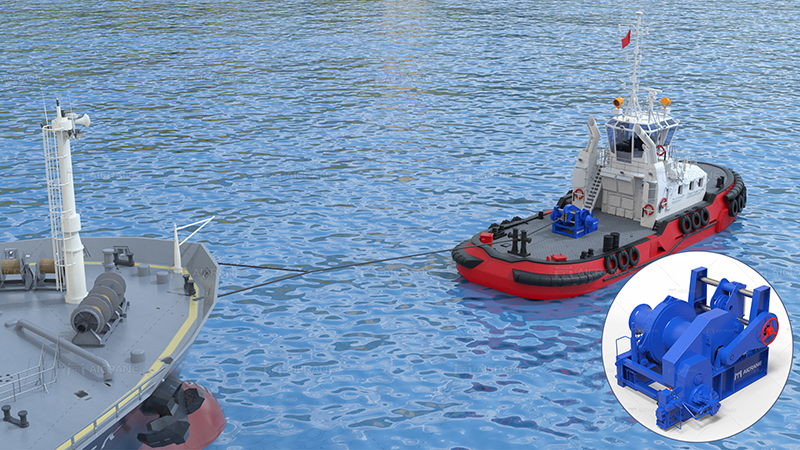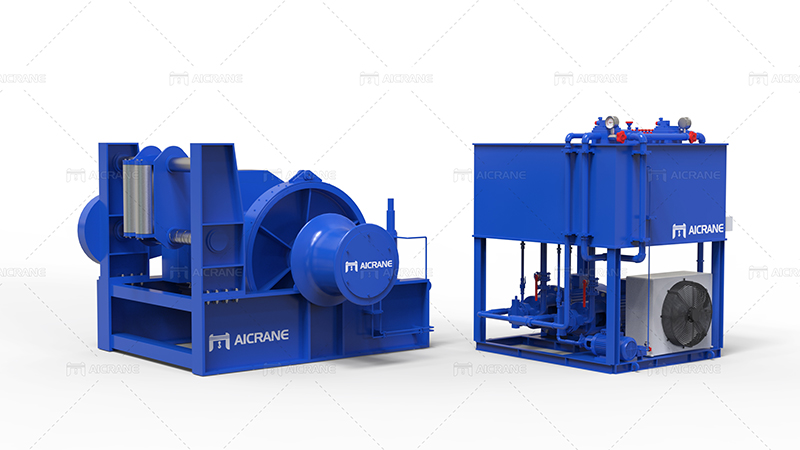Marine hydraulic towing winches play a critical role in various maritime operations, providing the necessary power to tow or anchor vessels safely. One of the key considerations in the design and operation of these winches is the selection of the towing wire or rope. The choice of towing wire is crucial as it directly impacts the winch’s performance, safety, and overall effectiveness in different maritime scenarios.

Factors Influencing Towing Wire Selection:
Load Capacity and Breaking Strength: The primary consideration when selecting a towing wire for a marine hydraulic towing winch is its load capacity and breaking strength. The towing wire must be capable of withstanding the maximum loads encountered during towing operations. Engineers carefully calculate the expected loads based on the size and weight of the vessels that the winch is intended to tow.
Material Composition: Towing wires are commonly made from materials such as steel or synthetic fibers. Steel wires are robust and durable, suitable for heavy-duty operations. On the other hand, synthetic fibers like high-strength polyethylene or polyester offer advantages such as lighter weight and resistance to corrosion. The choice depends on the specific requirements of the towing application.
Corrosion Resistance: In the harsh marine environment, corrosion is a significant concern. Towing wires are exposed to saltwater and other corrosive elements, making it essential to choose materials that resist corrosion. Stainless steel wires, for example, provide excellent corrosion resistance, ensuring a longer lifespan for the towing wire.
Flexibility and Bending Fatigue: The towing wire must be flexible enough to navigate through the winch’s pulley system and handle the bending stresses during towing. Bending fatigue resistance is crucial to prevent premature failure of the wire due to repeated bending and straightening. This is especially important for winches used in dynamic towing operations.

Abrasion Resistance: Towing wires are subjected to constant friction and abrasion during towing operations. The selected wire should have high abrasion resistance to withstand the wear and tear associated with dragging heavy loads over various surfaces. Abrasion-resistant coatings or materials can enhance the longevity of the towing wire.
Buoyancy: Depending on the application, buoyancy may be a critical factor. Synthetic fibers, being inherently buoyant, offer advantages in certain scenarios, such as deep-sea towing. The ability of the towing wire to stay afloat can impact safety and ease of handling.
Environmental Conditions: Consideration must be given to the environmental conditions in which the towing winch will operate. Extreme temperatures, ice, and other challenging conditions may require specific types of towing wires to ensure optimal performance.
Regulatory Compliance: Regulatory standards and industry guidelines often dictate the selection of materials and specifications for towing wires. Compliance with these standards is essential to ensure the safety and legality of maritime operations.
Compatibility with Winch Design: The towing wire must be compatible with the design and specifications of the hydraulic towing winch. This includes considerations such as the diameter of the drum, the type of spooling, and the overall dimensions of the winch system.
Conclusion:
In conclusion, the selection of the towing wire for a marine hydraulic towing winch is a multifaceted decision that involves careful consideration of load capacity, material properties, environmental factors, and regulatory requirements. The right towing wire ensures the safe and efficient operation of the winch, contributing to the overall success of maritime towing operations. Engineers and operators must collaborate closely to choose the most suitable towing wire for the specific needs of each hydraulic towing winch system, ultimately enhancing safety, reliability, and performance at sea. To learn more about winches, visit https://winchmachines.com/